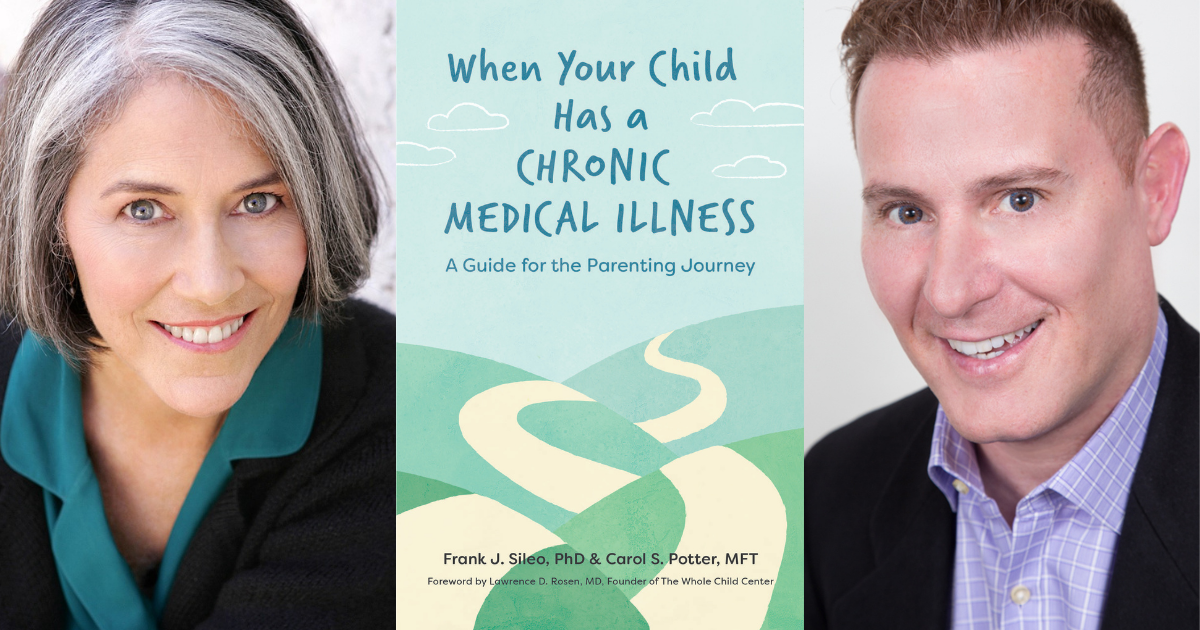
An interview with the authors of When Your Child Has a Chronic Medical Illness
Parenting can be tough as it is but when you throw a chronic illness into the mix, everything becomes that much more challenging.
That’s why when Frank Sileo, PhD, and Carol Potter, MFT, teamed up to write a parenting book together, the two leading mental health professionals decided to focus on tackling the psychological impacts of chronic illness for parents and families.
Their new book When Your Child Has a Chronic Medical Illness: A Guide for the Parenting Journey was released earlier this year. Both authors sat down with the Child Neurology Foundation to share their thoughts and take-aways from the book.
“Parents and caregivers really need to take care of themselves first and then help others. If you are depleted, you can’t really help your child as effectively,” says Sileo, a New Jersey licensed psychologist who has written a dozen other award-winning children’s books on a variety of psychological topics.
Self-Care For Caregivers
That message of self-care for caregivers is at the heart of the book. Parents are often so focused on ensuring their child gets the best possible medical care that it can be easy to overlook the impact the medical illness can have on the rest of the family’s relationships and emotions.
“We use the metaphor of a journey. We start with identifying first what you might be feeling and what your child might be feeling, and what the siblings might be feeling,” Sileo says.
Feelings like shock or denial. Anger. Fear. Sadness. Anxiety. Guilt. Grief. Blame. Loneliness. Helplessness. Sometimes even jealousy from a sibling.
“It may be worth your while to sit with those feelings or explore those feelings. Or reach out about those feelings, seek out a mental health professional or talk with parents in a similar situation. You are not alone in this,” says Sileo.
The Resiliency Toolbox
If facing those emotions is the first step of the journey, having the tools to manage them is next.
“We know that what makes a person resilient is having a positive attitude, regulating your emotions, those kinds of things – which is very challenging when your child is sick, in-and-out of a hospital and things are not getting better. But we also know that resiliency is created by teaching coping skills,” Sileo says.
“If you learn the skills, even if you don’t need to use them – you have them in your resiliency toolbox, so to speak, that you can always pull on.”
In the book, some of the coping skills Sileo and Potter go over include mindfulness, humor, social connectiveness, setting boundaries, spirituality – in whatever form that takes for a family – and a self-care routine.
Other practical advice in the book covers communicating with siblings and other family members, working with a medical team and school team, navigating hospital stays, asking for help and receiving respite care, and staying healthy on the journey. There is also an extensive list of external resources included.
Extending Your Fuse
Potter, a licensed marriage and family therapist who helped develop the strengths-oriented Best Practice Parenting program for the Southern California Counseling Center, emphasized that it’s not an easy journey for parents – but there are techniques and resources that can help.
“There will be those nights where you will get very little sleep because of what is going on with your child,” she says.
“But it’s very important to know your own fuse; when you are getting close to losing it and what action of self-care is going to help you extend that fuse, so you can cope better.”
Every family’s journey with chronic medical illness is unique and there is no one-size-fits all answer. But what is important is that there are options.
“The thing that we emphasized over and over again is that, while we hope to be giving you a lot of ideas and possibilities, you know your child best and you know your family best,” says Potter.
“We hope that by offering a lot of possibilities, we might open parents’ eyes to things they may not thought of that could work for their families. But always be listening to that inside gut understanding of what is needed in that moment. Trust yourself.”
For Potter, not losing sight of the big picture of the family aside from the challenges being faced is key.
“There is a way in which the illness takes over the family and the family can become very illness-orientated. We have a lot of suggestions in there about how to remember that you are a family with an illness, not an illness with a family attached,” she says.
When Your Child Has a Chronic Medical Illness: A Guide for the Parenting Journey is part of the APA LifeTools Series.
Need more information or support?
Talk to a trained peer support specialist who can help you navigate this journey.
Browse other topics on our Mental Health Hub.
Download a copy of the free Respite Care Notebook for the next time you take a break.
